- Home
- Amy Harmon
A Different Blue Page 2
A Different Blue Read online
Page 2
Jimmy had loved birds. If woodworking was his gift, bird watching was his hobby. He had a pair of binoculars, and he would often hike to a high spot where he could observe and document what he saw. He said birds were messengers and that if you watched them closely enough, you could discern all sorts of things. Shifting winds, approaching storms, dropping temperatures. You could even predict if there was danger nearby.
When I was very small it was hard for me to sit still. It actually still is. Birdwatching was hard for me, so Jimmy started leaving me behind when I was old enough to remain at camp alone. I was much more responsive to woodcarving simply because it was so physical.
I must have been seven or eight the first time I saw Jimmy get really excited about a bird sighting. We were in southern Utah, and I remember where we were only because Jimmy remarked on it.
“What is he doing in these parts?” he had marveled, his eyes fixed on a scrubby pine tree. I had followed his gaze to a little black bird perched halfway up the tree on a thin branch. Jimmy went for his binoculars, and I stayed still, watching the little bird. I didn't see anything special about it. It just looked like a bird. Its feathers were solid black – no flash of color to draw the eye or brilliant markings to admire.
“Yep. That's a Eurasian Blackbird all right. There are no blackbirds native to North America. Not like this guy. He's actually a thrush.” Jimmy was back, his voice a whisper as he looked through his binoculars. “He's a long way from home, or else he's escaped from somewhere.”
I whispered too, not wanting to scare it away if Jimmy thought it was special.
“Where do blackbirds usually live?”
“Europe, Asia, North Africa,” Jimmy murmured watching the orange-billed bird. “You can find them in Australia and New Zealand too.”
“How do you know it's a he?”
“Because the females don't have the glossy black feathers. They aren't as pretty.”
The little yellow eyes peered down at us, fully aware that we were watching. Without warning, the bird flew away. Jimmy watched him go, tracking him through the binoculars until he was beyond sight.
“His wings were as black as your hair,” Jimmy commented, turning away from the bird that had enlivened our morning. “Maybe that's what you are . . . a little blackbird a long way from home.”
I looked at our camper sitting in the trees. “We're not a long way from home, Jimmy,” I said, confused. Home was wherever Jimmy was.
“Blackbirds aren't considered bad luck like ravens and crows and other birds that are black. But they don't give up their secrets easily. They want us to figure them out. We have to earn their wisdom.”
“How do we earn it?” I wrinkled my nose up at him, baffled.
“We have to learn their story.”
“But he's a bird. How can we learn his story? He can't talk.” I was literal in the way all kids are literal. I would have really liked it if the blackbird could tell me his story. I would keep him as a pet, and he could tell me stories all day. I begged for stories from Jimmy.
“First you have to really want to know.” Jimmy looked down at me. “Then you have to watch. You have to listen. And after a while, you'll get to know him. You'll start to understand him. And he'll tell you his story.”
I took out a pencil and spun it around my fingers. I wrote, "Once Upon a Time" across the top of my sheet, just to be a smart ass. I smirked at the line. As if my story was a fairy tale. My smile faded.
“Once upon a time . . . there was a little blackbird,” I wrote. I stared at the page. “. . . pushed out of the nest, unwanted.”
Images gathered in my head. Long dark hair. A pinched mouth. That was all I could remember of my mother. I replaced the pinched mouth with a gently smiling face. A completely different face. Jimmy's face. That face brought a twinge of pain. I moved my inner eye to his hands. Brown hands moving the chisel across the heavy beam. Wood shavings piled on the floor at his feet where I sat, watching them fall. The shavings drifted down around my head, and I closed my eyes and imagined that they were tiny pixies coming to play with me. These were the things I liked to remember. The memory of the first time he had held my smaller hand in his and helped me strip away the heavy bark from an old stump rose in my mind like a welcome friend. He was talking softly about the image beneath the surface. As I listened to the memory of his voice, I let my mind trip back across the desert and up into the hills, remembering the gnarled claw of mesquite I had found the day before. It had been so heavy I'd had to drag it to my truck and hoist it, one side at time, into the truck bed. My fingers itched to peel back the charred skin and see what was beneath. I had a feeling about it. A shape was forming in my head. I tapped my feet and curled my fingers against the paper, daydreaming about what I could create.
The bell rang. The noise level in the room rose as if a switch had been flipped, and I jerked from my reverie and glared down at my page. My pathetic history waited for embellishment.
“Turn your papers in. And please make sure your name is at the top! I can't give you credit for your history if I don't know that it's yours!”
The room was empty in about ten seconds flat. Mr. Wilson struggled to align the stack of papers that had been shoved in his hands as students exuberantly vacated his classroom, eager for other things. The first day of school was officially over. He noticed me still sitting and cleared his throat a little.
"Miss . . . um . . . Echohawk?"
I stood abruptly and reached for my paper. I crumpled it into a ball and tossed it toward the trashcan beneath the white board. It didn't quite make it, but I didn't retrieve it. Instead, I grabbed my purse and the jacket that was completely unnecessary in the 110 degree heat that awaited me outside the school. I didn't look at my new teacher as I strode to the back of the room and swung my purse over my shoulder.
"Later, Wilson," I called out, not even turning my head.
Manny was waiting by my truck when I reached the student parking lot, and seeing him there made me groan. Manuel Jorge Rivas-Olivares, aka Manny, lived in my apartment complex. He and his little sister had adopted me. They were like the stray cats that would hang around your door and meow pitiously for days on end until you finally gave up and fed them. And when you finally fed them, it was over. They were officially your cats.
So it was with Manny and Graciela. They just kept hanging around until I finally took pity on them. Now they thought they belonged to me, and I didn't know how to make them go away. Manny was sixteen and Graciela was fourteen. Both were small-boned and fine-featured, and both were incredibly sweet and annoying. Just like cats.
There was a bus that ran to the complex, and I made sure Manny's mother knew all about it and even assisted her in getting Manny and Graciela registered to ride it. I really thought this year would be different now that Graciela was in ninth grade and would be riding the high school bus too. Guess not. Manny was waiting for me with a big smile and an armful of books.
“Hey, Blue! How was your first day? Big senior year, Chica! I bet you'll be homecoming queen this year. The most beautiful girl in the school should be homecoming queen, and you are definitely the most beautiful girl!” Very sweet, very annoying. Manny spoke a mile a minute with a slight Hispanic accent and just a hint of a lisp, which might have been the accent but was more likely just Manny.
“Hey, Manny. What happened to riding the bus?”
Manny's smile slipped a little, and I felt bad for asking. He waved my question away and shrugged.
“I know, I know. I told Gloria I would take the bus, and I made sure Graciela caught it . . . but I wanted to ride home with you on the first day. Did you see the new history teacher? I have him for first period, and I can tell he's going to be the best teacher I've ever had . . . and the cutest too!”
Manny had recently started calling his mother Gloria. I wasn't sure what that was about. I also considered telling him he might want to reconsider calling Mr. Wilson cute. I assumed that was who he was talking about. I didn't think
there were two new history teachers.
“I love his accent. I hardly heard anything he said all period!” Manny slid daintily in the passenger side when I unlocked my truck. I worried about the kid. He was more feminine than I was.
“I wonder what he is doing in Boulder? Ivy and Gabby are sure he is, like, MI-6 or something.” Manny had dozens of girlfriends. In fact, the girls all loved him because he was so non-threatening and fun, which made me wonder again why he couldn't ride the bus. It wasn't like he didn't have friends.
“What the hell is MI-6?” I grumped, trying to manuever through the crush of vehicles leaving the school. I hit my brakes as someone cut me off and then hung his middle finger out the window as if I was the one who pulled out in front of him. Manny reached over my arm and pounded on the horn.
“Manny! Stop! I'm the one driving, okay?” I commanded, knocking his hand away. It didn't even faze him.
“You don't know what MI-6 is? Freaking James Bond? Chica, you need to get out more!”
“What would someone from MI-6 be doing at Boulder High School?” I laughed.
“Beats me, but he's British, he's hot, and he's young.” Manny ticked his points off on graceful fingers. “What else could it be?”
“You really think he's hot?” I questioned doubtfully.
“Oh, definitely. In a very naughty librarian kind of way.”
“Oh, sick, Manny. That only works when the librarian is female.”
“Fine, a naughty professor then. He's got sexy eyes and floppy curls and his forearms are very well-developed. He's a hottie in disguise. Totally MI-6. Do you have to work tonight?” Manny bounced to a new subject, having clearly proven the new Mr. Wilson must be a spy.
“It's Monday. Monday means work, Manny.” I knew what he was fishing for and resisted. “Stop feeding the kitties,” I reminded myself firmly.
“I could sure go for some of Bev's quesadillas right now. I am one hungry Mexican.” Manny laid the accent on thick. He only referred to his ethnicity when he talked about food. “I sure hope Gloria remembered to go shopping before she left for work. Otherwise, me and baby sister are eating Ramen again,” Manny sighed mournfully.
The baby sister line was over the top, but I found myself weakening. Manny was the man of the house, and that meant providing for Graciela, which he did with gusto, even if providing meant asking me to provide. I worked at Bev's Cafe several nights a week, and without fail I brought home dinner for Manny and Graciela at least once during the week.
“Fine. I will bring you and Gracie some quesadillas. But this is the last time, Manny. It cuts into my paycheck,” I scolded. Manny smiled brilliantly at me and clapped his hands like Oprah does when she's excited.
“I will see if my uncle has any more mesquite you can have,” Manny promised, and I nodded and stuck out my hand to shake on it.
“Deal.”
Manny's Uncle Sal worked on a crew with the forest service. They frequently cleared scrub and brush and kept the mesquite from encroaching on government owned ranches. Last time Sal had come through for me, I had enough wood to last me two months of serious carving. I drooled at the thought.
“Of course, that means you will owe me, chica,” Manny suggested innocently. “Dinners for at least a month of Mondays, okay?”
I just laughed at his negotiating skills. He already owed me for two months of Mondays. But we both knew I would agree. I always did.
Chapter Two
OCTOBER 2010
Maybe it was the stories I was drawn to. Every day it was a new story. And quite frequently, the stories were about women in history, or told from the perspective of the women. Maybe it was just Mr. Wilson's obvious love of he subject he taught. Maybe it was simply his cool accent and his youth. The entire student body tried to mimic him. Girls crowded around him, and the boys watched him, fascinated, as if a rockstar had descended into our midsts. He was the talk of the school, an overnight sensation, instantly beloved because he was a novelty – and a very attractive novelty if you liked slightly unruly hair and grey eyes and British accents, which I told myself I did not. He was definitely not my type. Still, I found myself looking forward to my last class of the day with irritating impatience and was probably more adversarial than I would have otherwise been simply because I was puzzled by his allure.
Mr. Wilson had spent an entire month on the ancient Greeks. We had discussed epic battles, deep thinkers, architecture, and art, but today Wilson was detailing the different gods and what each represented. It was actually pretty fascinating, I had to admit, but incredibly irrelevant. I volunteered this observation, of course.
“This isn't exactly history,” I pointed out.
“The myths may not be historical fact, but the fact that the Greeks believed in them is,” Wilson responded patiently. “You must understand that Greek gods are an intrinsic part of Greek mythology. Our introduction to the ancient Greek gods can be traced all the way back to the writings of Homer in the Iliad and the Odyssey. Many scholars believe that the myths were actually influenced by the Mycenaean culture that existed in Greece between 1700 and 1100 BC. There is also evidence that the beginnings of Greek mythology can be traced back to the ancient Middle Eastern cultures of Mesopotamia and Anatolia because of the similarities between the mythology of these ancient Middle Eastern cultures and the ancient Greeks.”
We all just stared at him. What he'd said was about as clear as mud. He seemed to take note of our “huh?” expressions.
“The Greeks had a god to explain everything.” Wilson wasn't about to be deterred, and he dug into his argument. “The sunrises, the sunsets, their tragedies and their triumphs were all connected to the existence of these gods. In many ways, their gods brought sense to a senseless world. A strangely-shaped rock could be said to be a god disguised as a stone, or an unusually large tree might be a god in disguise as well. And that tree would be worshipped for fear that the god would retaliate. There were gods everywhere, and everything could be used as evidence of their existence. Wars were started in the names of the gods, oracles were consulted and their advice heeded, however hurtful or strange or bizarre that advice might be. Even the storm winds were personified. They were thought to be harpies – winged women who snatched things up, just like the wind, never to be seen again. Storm winds and the weather that came with them were blamed on these winged creatures.”
“I thought a harpy was just an old-fashioned word for witch,” a pimply kid named Bart volunteered. I was thinking the same thing but was glad someone else decided to speak up.
“In early versions of Greek myth, harpies were described as lovely-haired creatures, as beautiful women with wings. That changed over time, and in Roman mythology they were described as hideous-faced beasts with talons and even beaks. Hideous, nasty, bird-women. That image has persisted over time. Dante described the seventh hell in his Inferno as a place where harpies lived in the woods and tormented those who were sent there.” Wilson started reciting the poem, apparently from memory.
“Here the repellent harpies make their nests,
Who drove the Trojans from the Strophades
With dire announcements of the coming woe.
They have broad wings, a human neck and face,
Clawed feet and swollen, feathered bellies; they caw
Their lamentations in the eerie trees.”
“You have that lovely poem memorized, I see,” I said sarcastically, although I was mostly dumbfounded. Wilson burst out laughing, his serious face transformed by the action. I even cracked a smile. At least the guy could laugh at himself. Wow! Talk about a NERD. Who quoted Dante at will? And with that stuffy British accent I was sure he was going to say, “It's elementary, Miss Echohawk,” every time I asked him a question. He was still smiling when he continued.
“To answer your question, Miss Echohawk, what we believe affects our world in a very real way. What we believe affects our choices, our actions, and subsequently, our lives. The Greeks believed in their gods, and this
belief affected everything else. History is written according to what men believe, whether or not it's true. As the writer of your own history, what you believe influences the paths you take. Do you believe in something that may be a myth? I'm not talking about religious beliefs, per se. I'm talking about things you've told yourself, or things you've been told for so long that you just assume that they are true.”
Mr. Wilson turned and picked up a stack of papers. He started passing them out as he talked.
“I want you to think about this. What if what you believe about yourself or about your life is simply a myth that is holding you back?”
Mr. Wilson set a wrinkled sheet of paper on my desk and moved on without comment. It was my personal history. The history I'd thrown toward the garbage can the first day of school. It had been pressed and smoothed, but it bore the signs of having been discarded. It would never be the same. No amount of pressing and smoothing would ever disguise the fact that it had been rescued from the trash.
"Once upon a time . . . there was a little blackbird, pushed from the nest. Unwanted."
I added a word. Discarded. I read it to myself.
"Once upon a time . . . there was a little blackbird, pushed from the nest. Unwanted. Discarded.”

 Prom Night in Purgatory
Prom Night in Purgatory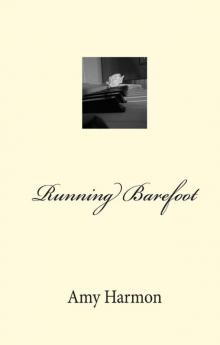 Running Barefoot
Running Barefoot The Queen and the Cure
The Queen and the Cure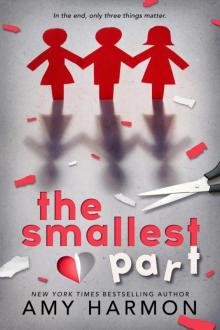 The Smallest Part
The Smallest Part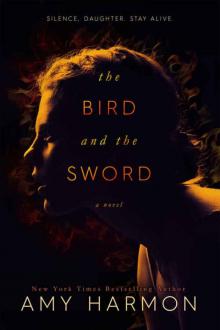 The Bird and the Sword
The Bird and the Sword The Song of David
The Song of David Infinity + One
Infinity + One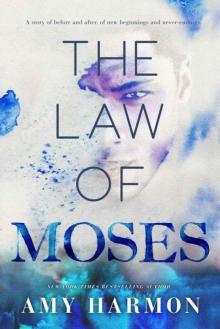 The Law of Moses
The Law of Moses A Different Blue
A Different Blue From Sand and Ash
From Sand and Ash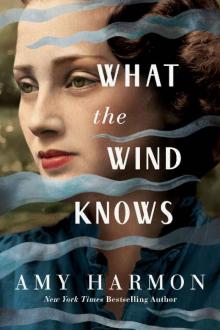 What the Wind Knows
What the Wind Knows Slow Dance in Purgatory
Slow Dance in Purgatory Romance Through the Ages
Romance Through the Ages